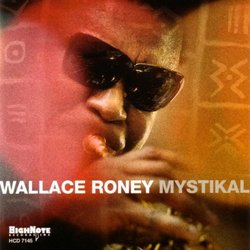| All Artists: Wallace Roney Title: Mystikal Members Wishing: 0 Total Copies: 0 Label: Highnote Original Release Date: 1/1/2005 Re-Release Date: 9/27/2005 Genres: Jazz, Pop Styles: Jazz Fusion, Modern Postbebop, Bebop Number of Discs: 1 SwapaCD Credits: 1 UPC: 632375714529 |
Search - Wallace Roney :: Mystikal
 | Wallace Roney Mystikal Genres: Jazz, Pop
|
Larger Image |
CD Details |
CD ReviewsThe Best Jazz CD in 2006 Jazz Life | St. Louis, MO | 06/19/2006 (5 out of 5 stars) "I saw this review in All About Jazz and thought it appropriate for the CD. This CD is a must for anyone interested in good music. Better than any of the other jazz and jazz/fusion CDs this year. It's gotta be - he's the one they are listening to for their inspiration. (the untold secret) A reviewer after seeing Roney's performance at the 2006 Rock and Roll Hall of Fame said that he didn't want to hear any more Chris Botti - after Roney. I agree. Trumpeter Wallace Roney has been working in jazz for over thirty years. He made his recording debut at age fourteen and played in the bands of Tony Williams, Art Blakey, David Murray and Herbie Hancock--just to name a few. A bandleader on his own for many years, Roney has dazzling chops and has composed some classic songs. He's never led a bad group, and when I saw him at Chicago's Green Mill in late August, the band was dazzling--powerful but supple, densely layered but capable of immediate transition. Roney's most famous mentor was, of course, Miles Davis. It can't be denied that Davis' work and example still color Roney's music. His mentoring has also been as much curse as blessing, having forced Roney to endure years of facile, simplistic comparisons to Miles. None of this should obscure the fact that Roney has a fine body of recorded work as a leader. In recent years--to some extent under the radar--he's produced a run of especially superlative recordings. 1996's Village was the end of his long assocition with Warner Bros., but his 2000 album No Room For Argument (Stretch Records) was, to these ears, his finest album to date; 2004's Prototype and the new Mystikal (both on HighNote Records) have continued Roney's streak of great CDs. We're all the sum of our experiences. Few can say that their lives haven't been influenced in some way by the views or work of others. So when people latch onto the effect that Miles Davis had on trumpeter Wallace Roney, it's fair to ask, "so what?" Roney hung with Miles during his formative years, and the impact of the experience on his development is something he makes no attempt to cover up. But anyone who has listened to Roney's voice--most notably beginning with `97's Village, where he began to assimilate African rhythms and more electric orchestration, and continuing through last year's fine HighNote debut Prototype--will realize that in some ways Roney is no different than anyone else. His approach may be filtered through myriad influences from Coltrane to Herbie Hancock's Mwandishi group and early Weather Report, but at the end of the day he sounds like nobody but himself. Mystikal continues Roney's progression. With the same core group as on Prototype--pianist/keyboardist Geri Allen, reed player Antoine Roney, keyboardist Adam Holzman, bassist Matt Garrison, and drummer Eric Allen--it's not just about the evolution of the leader's approach, this time it's also about the evolution of a collective sound. Roney's approach is becoming increasingly all-inclusive. Two common threads tie together these original pieces, ranging from the rhythmically complex, all-acoustic title track to the more propulsive and electric "Stargaze" and "NiceTown." The thematic conception focuses on breaking down bar lines and creating longer form melodies that float ethereally above the rhythm section; and an open collective approach allows these structured pieces to breathe. A diverse set of covers mingle with original compositions. The acoustic quartet reading of Kenny Dorham's "Poetic" demonstrates that Roney hasn't completely left his post bop roots behind--as does Bud Powell's ballad "I'll Keep Loving You," a gorgeous duet with Allen that closes the album. Looking to more contemporary sources, a joyously danceable version of rapper Slick Rick's reggae tune "Hey Young World" feels faithful until the end of each phrase, where an ambiguous chord hangs and breaks things up. The Temptations ballad "Just My Imagination" is equally carefree, exposing Roney at his most tender. Most revealing is the opening track. "Atlantis" retains composer Wayne Shorter's harmonic complexity, but it opens up expansively for Roney's probing solo, which is spare, lyrical, and emotionally to-the-point, without a note wasted. Over the course of Wallace's last four records, brother Antoine has proved his association is all about the playing and has nothing to do with nepotism. The Shorter influence is clear but, as with Wallace, it would be unfairly dismissive to leave it at that. Allen, of course, has her own career; but when she plays with husband Wallace Roney, there's a simpatico that comes from shared life experiences beyond the musical. Garrison is one of today's best young bassists--lithe and virtuosic, yet always keeping his ears open. As Roney's concept becomes more eclectic, it paradoxically becomes more focused. Mystikal continues his path towards combining past and present--with, most importantly, a clear eye on the future. " No surprise. Jaume Roglan Cuartilles | 02/13/2008 (5 out of 5 stars) "It's no surprise this album by W.Roney. More tha anything because he is getting us used to his amazing creativity. So, it's true that Miles Davis is present, so what! And, of course, Wallace performs with a great band."
|

 Track Listings (9) - Disc #1
Track Listings (9) - Disc #1